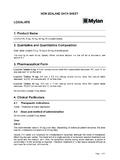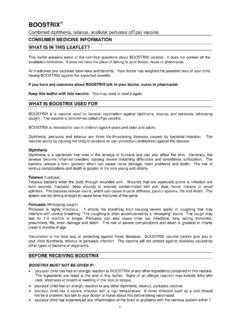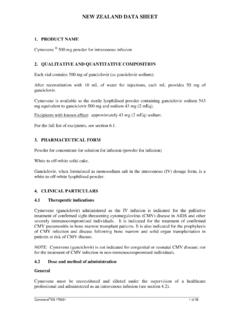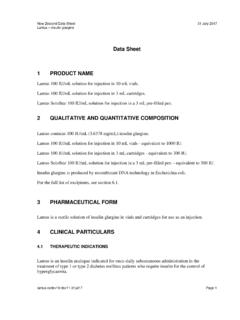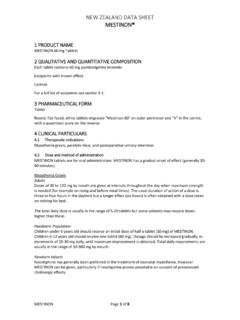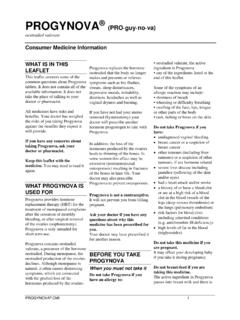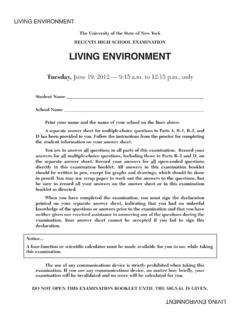Transcription of What is in this leaflet - Medsafe Home Page
1 Page 1 of 4 NEW ZEALAND CONSUMER MEDICINE INFORMATION SYNTHROID levothyroxine sodium, 25 mcg, 50 mcg and 100 mcg Tablets what is in this leaflet this leaflet answers some common questions about SYNTHROID. It does not contain all the available information. It does not take the place of talking to your doctor or pharmacist. Please read it carefully and keep it for future reference. All medicines have risks and benefits. Your doctor has weighed the risks of you taking SYNTHROID against the benefits they expect it will have for you. Talk to your doctor, nurse or pharmacist if you have any concerns about taking SYNTHROID.
2 Your doctor and pharmacist have more information. what SYNTHROID is used for SYNTHROID is used to replace a hormone that is normally produced by your thyroid gland. It is also used to help decrease the size of enlarged thyroid glands (known as goiter) and to treat thyroid cancer. The thyroid gland produces and releases two hormones: thyroxine and liothyronine. These hormones are responsible for maintaining a normal rate of metabolism in the body. When the thyroid gland is unable to produce normal amounts of thyroxine, the level of thyroid hormones in the blood decreases (hypothyroidism). this results in a reduced rate of metabolism and interferes with the proper function of many body organs.
3 SYNTHROID contains levothyroxine sodium, the same as the thyroxine hormone, produced by the normally functioning thyroid gland. Generally, replacement therapy is to be taken for life, except in cases of transient (temporary) hypothyroidism, which is usually associated with inflammation of the thyroid gland (thyroiditis). Ask your doctor if you have questions about why SYNTHROID has been prescribed for you. Your doctor may have prescribed SYNTHROID for another reason. Before you take SYNTHROID When you must not take it SYNTHROID should not be used in patients with: Over active thyroid gland (thyrotoxicosis) of any cause.
4 Uncorrected adrenal gland under-activity. A history of any cardiac event. Any unusual or allergic reaction to, levothyroxine, other thyroid hormones or any of the inactive ingredients. Some of the symptoms of an allergic reaction may include: shortness of breath; wheezing or difficulty breathing; swelling of the face, lips, tongue or other parts of the body; rash, itching or hives on the skin. Talk to your doctor or pharmacist if you are not sure whether you should take SYNTHROID. Before you start to take it Tell your doctor if: You are allergic to any foods or medication. You are pregnant or intend to become pregnant, or are breast-feeding.
5 If you become pregnant while taking SYNTHROID, your dose of SYNTHROID will likely have to be increased. You have any heart problem, whether or not you have received treatment for them (especially history of heart attack, heart disease, hardening of the arteries). You have other medical problems, whether or not you have received treatment for them (especially high blood pressure, osteoporosis, blood clotting disorder, or history of thyroid, adrenal and/or pituitary gland problems). You have diabetes, your dose of insulin or oral antidiabetic agent may need to be changed after starting SYNTHROID. You should monitor your blood and urinary sugar levels as directed by your doctor and report any changes to your doctor immediately.
6 You are taking an oral anticoagulant (blood thinner) such as warfarin, your dose may need to be changed after starting SYNTHROID. You are taking any other medications (prescription or over- the-counter). You are planning to have any kind of surgery (including dental surgery) or emergency treatment. You should inform your Page 2 of 4 doctor or dentist that you are taking SYNTHROID before having any kind of surgery. Your brand of levothyroxine was changed. If you are on long-term therapy, you may experience decreases in bone density. Taking other medicines Tell your doctor or pharmacist if you are taking any other medicines, including any that you get without a prescription from your pharmacy, supermarket or health food shop, or if you have received a vaccine.
7 Some medicines and SYNTHROID may interfere with each other. These include: Antacids containing calcium, aluminium and magnesium. Anticoagulants (blood thinners) such as warfarin and aspirin. Medicines for depression or other mental health conditions ( lithium, amitriptyline, diazepam). Anti-diabetic agents (insulin or oral hypoglycaemic drugs, metformin). Medicines used to treat blood pressure and heart problems, such as atenolol, propranolol, metoprolol and sotalol. Cytokines ( interferon-alpha and interleukin-2), medicines used for the immune system. Digitalis glycosides ( digoxin).
8 Ferrous sulfate, iron supplements. Glucocorticoids (corticosteroids such as dexamethasone or prednisone). Medicines used to lower cholesterol such as statins ( simvastatin, lovastatin), bile acid sequestrants ( colestipol), cholestyramine ( Questran), and clofibrate. Medicines for asthma or other breathing problems. Medicines for colds, sinus problems, or hay fever or other allergies (including nose drops or sprays). Medicines used to treat certain forms of cancer ( imatinib, tamoxifen and 5-fluorouracil). Medicines used for weight loss. Protein pump inhibitors (medicines used to reduce the amount of stomach acid produced), such as omeprazole, lansoprazole and pantoprazole.
9 Epilepsy medication phenytoin, carbamazepine. Pain & anti-inflammatory medications ( ibuprofen, paracetamol). Oestrogen containing medicines for hormone replacement therapy (HRT) and oral contraceptives. Some medicines may interfere with any blood tests done to determine thyroid hormone levels (thyroid function tests). It is important to inform your doctor of all medicines you are taking before and at the time of blood tests. Eating and drinking certain foods such as soybean flour, soybean infant formula, cotton seed, walnuts, calcium and dietary fibre may decrease absorption of levothyroxine. You may require a change in the dose.
10 How to take SYNTHROID Use SYNTHROID only as prescribed by your doctor. Thyroid hormone replacement is usually taken for life. Do not change the amount you take or how often you take it, unless directed to do so by your doctor. Like all medicines obtained from your doctor, SYNTHROID must be used only by you and for the condition determined appropriate by your doctor. Do not stop taking levothyroxine sodium without talking to your doctor. Take SYNTHROID as a single dose, preferably on an empty stomach, one half-to one hour before breakfast. SYNTHROID should be taken with a full glass of water. As food and drink can significantly change the absorption of SYNTHROID, you are advised to take SYNTHROID at the same time every day and be consistent in how you take it with regards to meals [ either always take it on an empty stomach (preferred method) or always take it with food].

